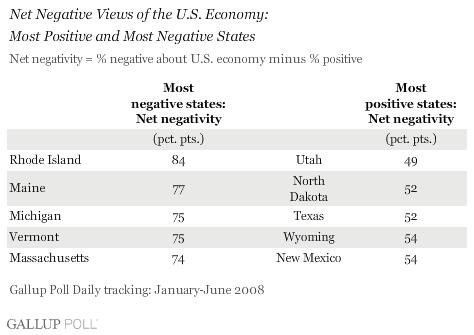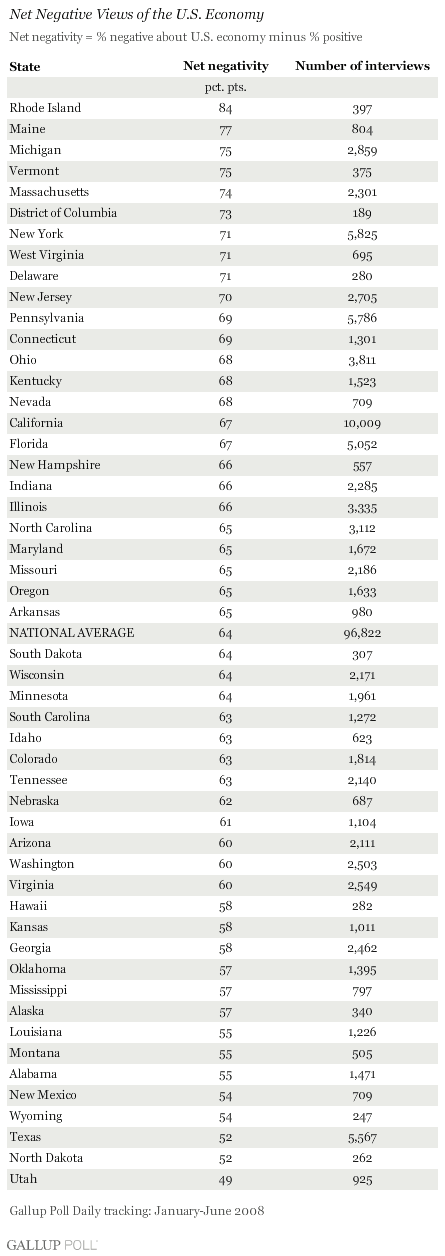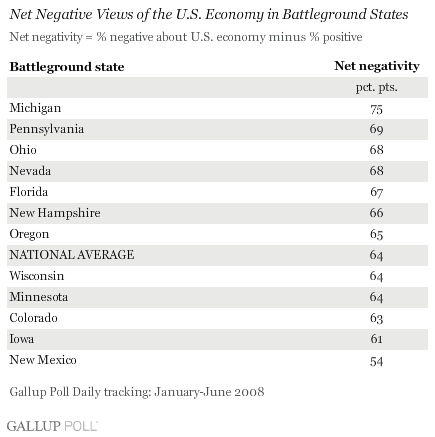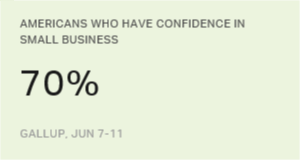PRINCETON, NJ -- Americans across the country are very negative about the U.S. economy, but this negativity is not distributed equally. Residents of states such as Utah, North Dakota, and Texas are well below average in their negativity. Residents of other states, such as Rhode Island, Maine, and Michigan are well above average.

These conclusions are based on an analysis of 96,822 interviews conducted over the last six months as part of the Gallup Poll Daily tracking program.
During that time, 8% of Americans on average can be classified as "positive" about the U.S. economy. This is based on a Gallup calculation taking into account views of both the current economy and the direction of the economy going forward. A much higher 73% can be classified as negative on the U.S. economy (17% are "mixed"). A net negativity index results when the percentage who are negative is subtracted from the percentage who are positive. For the country as a whole, the net negativity index value for the first six months of 2008 is 64.
Not all states are created equal in this regard, however. Although in every state, many more residents view the U.S. economy negatively than view it positively, there is significant variation across states in this average negativity rating of the U.S. economy.

At the low end of the negative range (i.e., states that are least negative, on a relative basis) are Utah, North Dakota, Texas, Wyoming and New Mexico. The net negative rating in each of these states is 10 or more points below the overall average for the United States.
At the high end of the negative range (i.e., states in which residents are the most negative about the U.S. economy) are Rhode Island, Maine, Michigan, Vermont, and Massachusetts. Each of these has an average net negative rating that is 10 or more points higher than the national average.
The difference in net negativity between the two extreme groups of states is large. The average net negativity for the five least negative states is 52; the average net negativity for the five most negative states is 76. The most negative single state, Rhode Island, has a net negative rating that is 35 points higher than Utah's 49 net negative rating.
Battleground States
The economy is shaping up to be the top issue in this presidential election year. There is thus a natural interest in the economic sentiments of residents living in the "battleground" states in which the candidates will be targeting the majority of their campaigning. The accompanying table displays the net negative views of the U.S. economy within the 12 battleground states in which neither George W. Bush nor John Kerry had more than a five-point margin of victory in the 2004 popular vote.

Many of these states are close to the national average net negativity value of 64. But the data show that the candidates would want to be particularly focused on the economy in a state like Michigan, and perhaps a little less so in a state like New Mexico.
Implications
By historical standards, Americans at this juncture are very negative about the U.S. economy. Gallup calculations show that subtracting the percentage of Americans who are negative from the percentage who are positive yields a net negative gap of 64 points.
There are, however, variations in views of the national economy by region. The questions on which these measures are based ask about the national economy, not individual state or local economies. Still, residents of certain states -- including those benefiting from the run-up in energy prices, such as Texas and Wyoming -- are much less negative in their views of the U.S. economy than are residents of Northeastern states and of Michigan, the latter hit hard by the downturn in the auto industry.
Residents of most of the 12 battleground states that will be key focus points in this year's presidential campaign are neither significantly more positive nor more negative than the national average in their views of the economy. This suggests that in terms of economic planks in their platforms, the candidates can approach most swing states in a broad manner that is no different from their national pronouncements on the economy. There are two exceptions: the battleground state of Michigan has residents who are among the most negative of any state, while residents of the battleground state of New Mexico are among the least negative.
Survey Methods
Results are based on telephone interviews with 96,822 national adults, aged 18 and older, conducted Jan. 2-June 30, 2008, as part of Gallup Poll Daily tracking. The margin of sample error for each state varies depending on the sample size for that state.
Interviews are conducted with respondents on land-line telephones (for respondents with a land-line telephone) and cellular phones (for respondents who are cell-phone only).
In addition to sampling error, question wording and practical difficulties in conducting surveys can introduce error or bias into the findings of public opinion polls.
To provide feedback or suggestions about how to improve Gallup.com, please e-mail feedback@gallup.com.
